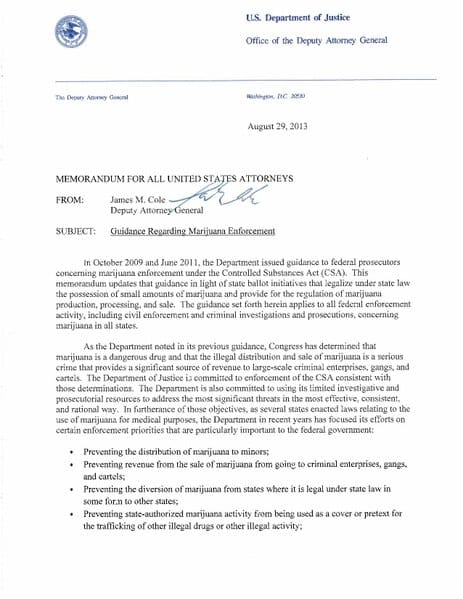Cole Memo Rescinded

On January 4, 2018, Attorney General of the United States Jeff Sessions rescinded the 2013 Cole Memo, which provided protections from federal prosecution for states in which cannabis is legalized.
Under the Cole Memo, federal prosecutors were disallowed from using any resources to enforce federal laws prohibiting marijuana. Now, they have been given full oversight into how to enforce those laws.
Immediately, Colorado Republican Sen. Cory Gardner responded that the DOJ “has trampled on the will of the voters” in the 8 states with recreational cannabis legalization. He also stated that the Attorney General committed to upholding the Cole Memo in conversation prior to his confirmation to office.
Washington’s Gov. Jay Inslee stated that Washington will “vigorously defend” the Cole Memo and the voter-approved cannabis laws against federal intervention. He stated, “It … disrespects Washington voters who have chosen a different path for our state.”
The Attorney General of Washington State, Bob Ferguson, says Sessions has refused to meet with him. Gov. Inslee reinforced this refusal.
As the real impact of this change clarifies, many cannabis professionals offer different interpretations. Some propose this indicates a return to aggressive federal prosecution of cannabis laws. Others believe this is a preparatory to cannabis being rescheduled or removed from the Federal Schedule of Controlled Substances.
by: Michael ‘the Aging Ent’ Schroeder, owner, Green Owl Media
From Wikipedia: The Cole Memorandum was a United States Department of Justice memorandum issued August 29, 2013, by United States Deputy Attorney GeneralJames M. Cole during the presidency of Barack Obama. The memorandum, sent to all United States Attorneys, governed federal prosecution of offenses related to marijuana. The memo stated that given its limited resources, the Justice Department would not enforce federal marijuana prohibition in states that “legalized marijuana in some form and … implemented strong and effective regulatory and enforcement systems to control the cultivation, distribution, sale, and possession of marijuana,” except where a lack of federal enforcement would undermine federal priorities (such as preventing violence in marijuana cultivation and distribution, preventing cannabis impaired driving, and preventing marijuana revenues from going to gangs and cartels).[1][2]
